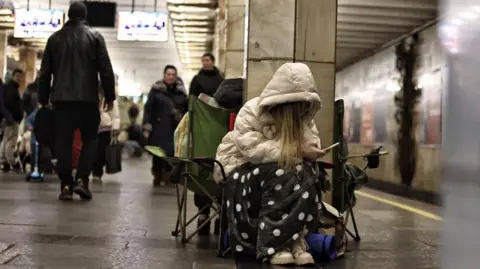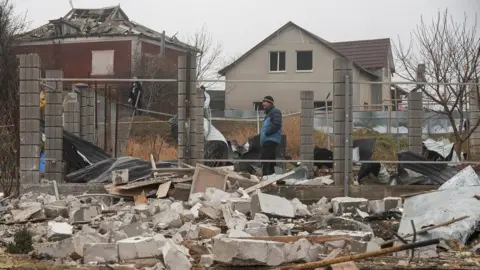
 Getty Images
Getty Images
Russian President Vladimir Putin has threatened to attack decision-making centres in the Ukrainian capital of Kyiv with the country’s new ballistic missile, Oreshnik.
Putin was speaking during a visit to Kazakhstan, hours after Russia launched a “comprehensive” strike on Ukraine’s energy grid overnight, leaving more than one million people without power. There were no fatalities.
“It was a response to continued attacks on our territory by Atacms missiles,” Putin said.
Ukraine used Atacms and Storm Shadow missiles to strike inside Russian territory last week for the first time since the full-scale invasion of February 2022, following approval by the Western suppliers, the US, the UK and France.
The overnight Russian strike unfolded over several hours with waves of drones and missiles flying across the length and breadth of Ukraine – the second attack of its kind this month.
Ukrainian President Volodymyr Zelensky said cluster munitions were used specifically against civilian and energy infrastructure.
“These cluster munitions make it significantly more difficult for our rescuers and energy workers to liquidate the impact of the strikes,” he added, calling it a “very mean escalation” in the conflict.
Putin said Russia had launched 90 missiles and 100 drones in response to Ukraine’s attacks with UK- and US-supplied weapons.
They included the “Oreshnik” – a new type of missile which flies at 10 times the speed of sound and – according to Putin – cannot be intercepted.
Putin added that Russia was selecting targets in Ukraine that could include decision-making centres in Kyiv.
“Through these statements, Putin demonstrates that he is the only person who wants to continue this war and expand this war,” Ukraine’s foreign ministry responded.
The Russian leader said Moscow would not allow Ukraine to get nuclear weapons, and if it ever did, would use “all means of destruction at Russia’s disposal”, according to Russia’s state-run news agency RIA.
This is thought to be a reference to reports in the New York Times newspaper last week that unnamed Western officials had suggested giving Ukraine nuclear weapons before US President Joe Biden leaves office in January.
Zelensky has also repeatedly complained that the 1994 Budapest Memorandum, by which Ukraine gave up its nuclear weapons inherited from the USSR, had left the country without the necessary security.

 Reuters
Reuters
The Russian attacks caused explosions in several cities, including Odesa, Kharkiv and Lutsk.
Kyiv was also the target of attacks, but Ukrainian authorities say all missiles targeting the capital were intercepted.
Kyiv’s military administration said the attack lasted almost nine-and-a-half hours.
At least 12 areas across Ukraine, including three western regions, have been hit and Energy Minister Herman Halushchenko said emergency power outages had been introduced.
Elsewhere, the mayor of Kharkiv, Ihor Terekhov, said there was shelling of a civilian area in the city, while the mayor of Lutsk, Ihor Polishchuk, said multiple explosions had been heard and electricity was out in part of the city.
Polishchuk said trolleybuses in Lutsk had stopped while the head of the Rivne administration Oleksandr Koval said electricity supplies had been cut to more than 280,000 people in the western region.
In the Lviv region, as many as 523,000 homes and businesses are without electricity, according to regional head Maksym Kozytsky.
Ukrainian authorities have responded by implementing pre-emptive emergency power cuts in order to minimise damaging overloads to the country’s grid.
Temperatures are dropping and the country has already experienced its first snowfalls, but the full force of Ukraine’s famously harsh winter has not yet been felt.
Ukrainian officials have been warning for some time that Russia has been stockpiling cruise and ballistic missiles in order to launch coordinated and country-wide attacks on Ukraine’s energy system.
If Russia keeps up these country-wide attacks on Ukraine’s energy system, as it has in previous winters, then the country will once again face a challenging few months.

 Reuters
Reuters
Earlier this month, Ukraine’s largest private energy company, DTEK, said its thermal energy plants suffered “significant damage”, resulting in blackouts.
Thursday’s attack was the eleventh “major attack” the country’s energy system had faced since March, DTEK said.
Since Russia’s full-scale invasion of Ukraine, its plants have been attacked more than 190 times.
DTEK added that the European Commission and the US had given them up to €107m (£89m) of equipment aid to restore power.
Ukrainian officials fear the most recent strike could signal another concerted Russian attempt to deplete the power grid as winter arrives.
In Kherson, authorities said they could be left without electricity for days.
Having already endured two-and-a-half bitter winters since Russia’s full-scale invasion in February 2022, Ukrainians are bracing themselves for another.
Following a conversation with Zelensky on the overnight attack, UK Prime Minister Sir Keir Starmer called the attack on the energy sector “depraved”.








